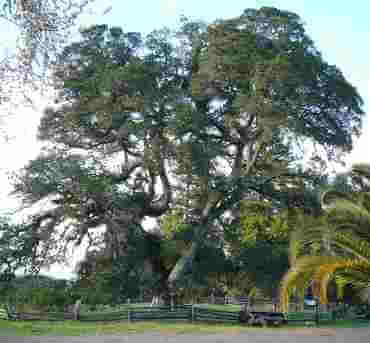Tree

In general, trees represent the deepest and most significant intellectual concepts: the ones that come to us most directly from the Lord. This varies depending on us and our states: the people of the Most Ancient Church, who were in a state of loving the Lord, understood truth automatically and internally through what the Writings call "perception"; people in lower states (including most of us) have to work a little harder to learn it from the Word and by willing to follow the Lord. In other parts of the Bible, especially in the prophets and New Testament parables, the meaning of "tree" is broader, meaning not just a person's intellectual concepts but the whole person.
'Trees,' as in Joel 1:10-12, signify knowledges.
Arcana Coelestia #893
893. Verse 13 And it happened in the six hundred and first year, at the beginning, on the first of the month, that the waters dried up from over the earth, and Noah removed the covering of the ark, and saw out, and behold, the face 1 of the ground was dry.
'It happened in the six hundred and first year' means a finishing point. 'At the beginning, on the first of the month' means a starting point. 'The waters dried up from over the earth' means that falsities were not at that time apparent. 'And Noah removed the covering of the ark, and saw out' means the light, once falsities had been removed, shed by the truths of faith, which he acknowledged and in which he had faith. 'And behold, the face 1 of the ground was dry' means regeneration.
Footnotes:
1. literally, the faces
[893a] 1
That 'it happened in the six hundred and first year means a finishing point is clear from the meaning of the number six hundred, dealt with at Chapter 7:6, in 737, as a beginning, and in particular in that verse as the beginning of temptation. The end of it is specified by the same number, with a whole year having now passed by. It took place therefore at the end of a year, and this also is why the words are added 'at the beginning, on the first of the month', meaning a starting point. In the Word any complete period is specified either by a day, or a week, or a month, or a year, and even by a hundred or a thousand years - for example, 'the days' mentioned in Genesis 1, which meant stages in the regeneration of the member of the Most Ancient Church. For in the internal sense day and year mean nothing else than a period of time; and meaning a period of time they also mean a state. Consequently a year stands in the Word for a period of time and for a state, as in Isaiah,
To proclaim the year of Jehovah's good pleasure, and the day of vengeance for our God; to comfort all who mourn. Isaiah 61:2.
This refers to the Lord's Coming. In the same prophet,
The day of vengeance was in My heart, and the year of My redeemed had come. Isaiah 63:4.
Here too 'day' and 'year' stand for a period of time and for a state. In Habakkuk,
Your work, O Jehovah, in the midst of the years make it live, in the midst of the years do You make it known. Habakkuk 3:2.
Here 'years' stands for a period of time and for a state. In David,
'You are God Himself, and Your years have no end. Psalms 102:27.
This statement, in which 'years' stands for periods of time, means that time does not exist with God. The same applies in the present verse where 'the year' of the flood in no way means any one particular year but a period of time that is not determined by a specific number of years. At the same time it means a state. See what has been said already about 'years' in 482, 487, 488, 493.
1. This paragraph is not numbered in the Latin.







